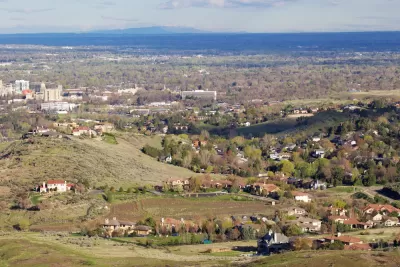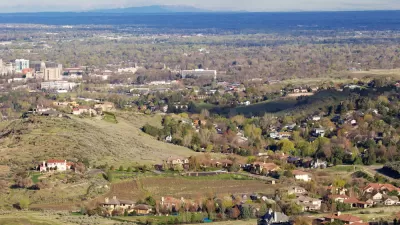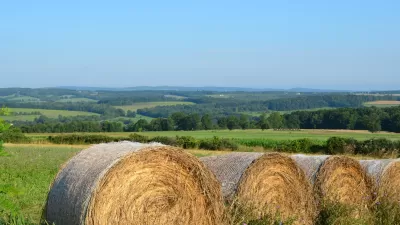Will the arid West’s farms and settlements thrive for another century? Better conservation policy should take a longer view.

Gracy Olmstead writes on the rapid growth in the Mountain West, where suburban development is competing with and water and farms. Boise, for example, sits adjacent to prized farmland known as the Treasure Valley, and the "is the single largest contributor to the state’s economy."
Olmstead considers the pressure on growth happening in just one place, "an exurb of Boise called Meridian that was [in 2017] the fifth-fastest-growing city in the United States." And the larger demographics also put pressure on this region: "among the top 10 states that grew from 2017 to 2018, the Census found that the top four are Western, arid states: Nevada, Utah, Idaho, and Arizona."
Olmstead turns to the long history of settlement in the American West, and focuses on the 19th-century explorer John Wesley Powell: "Perhaps more than any other man of his time, he comprehended the limits of Western geography, and suggested that inhabiting the land would require a far different set of rhythms than those we had cultivated up to that point." Yet U.S. officials of the day went on handing "out land in rectangular 160-acre parcels—and ignored the implications of the west’s aridity."
Today, regional planners may consider public-policy innovations such as Transfer of Development Rights (TDR), and Olmstead suggests Western areas may want to follow this approach, where "a developer can buy a landowner’s development rights and transfer them to a different area." "Argrihoods," such as Serenbe outside of Atlanta, may also save farmland alongside development. Still, Olmstead concludes that "one of the most important challenges for today’s farmers in the West will be decreasing the gap between their land’s agricultural value and its real-estate development value." To find solutions, "Powell suggested another way forward: a more local, regional approach, in which farmers might work together to protect their water rights, desert cities might steward resources more wisely, and Western towns might cultivate cooperation and shared trust."
FULL STORY: The Forgotten Treasure In Western Land

Alabama: Trump Terminates Settlements for Black Communities Harmed By Raw Sewage
Trump deemed the landmark civil rights agreement “illegal DEI and environmental justice policy.”

Study: Maui’s Plan to Convert Vacation Rentals to Long-Term Housing Could Cause Nearly $1 Billion Economic Loss
The plan would reduce visitor accommodation by 25% resulting in 1,900 jobs lost.

Planetizen Federal Action Tracker
A weekly monitor of how Trump’s orders and actions are impacting planners and planning in America.

Waymo Gets Permission to Map SF’s Market Street
If allowed to operate on the traffic-restricted street, Waymo’s autonomous taxis would have a leg up over ride-hailing competitors — and counter the city’s efforts to grow bike and pedestrian on the thoroughfare.

Parklet Symposium Highlights the Success of Shared Spaces
Parklets got a boost during the Covid-19 pandemic, when the concept was translated to outdoor dining programs that offered restaurants a lifeline during the shutdown.

Federal Homelessness Agency Places Entire Staff on Leave
The U.S. Interagency Council on Homelessness is the only federal agency dedicated to preventing and ending homelessness.
Urban Design for Planners 1: Software Tools
This six-course series explores essential urban design concepts using open source software and equips planners with the tools they need to participate fully in the urban design process.
Planning for Universal Design
Learn the tools for implementing Universal Design in planning regulations.
Caltrans
Smith Gee Studio
Institute for Housing and Urban Development Studies (IHS)
City of Grandview
Harvard GSD Executive Education
Toledo-Lucas County Plan Commissions
Salt Lake City
NYU Wagner Graduate School of Public Service




























